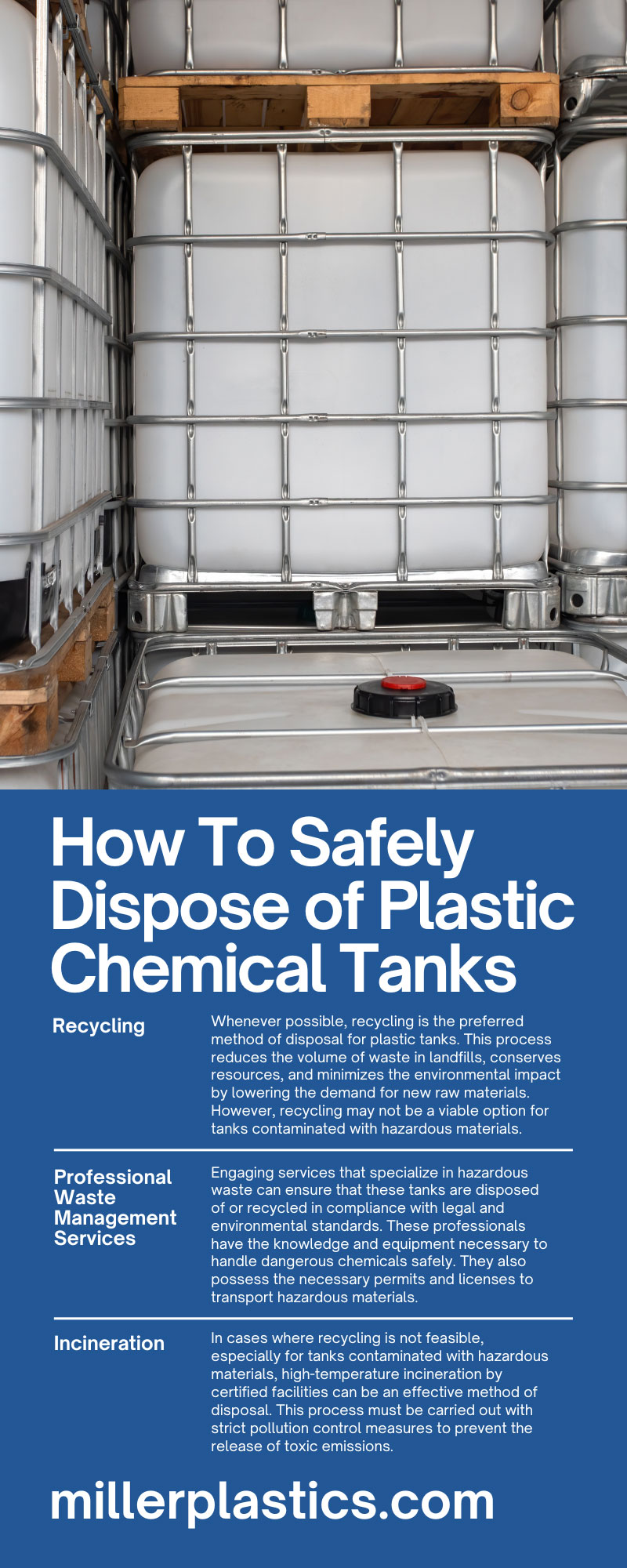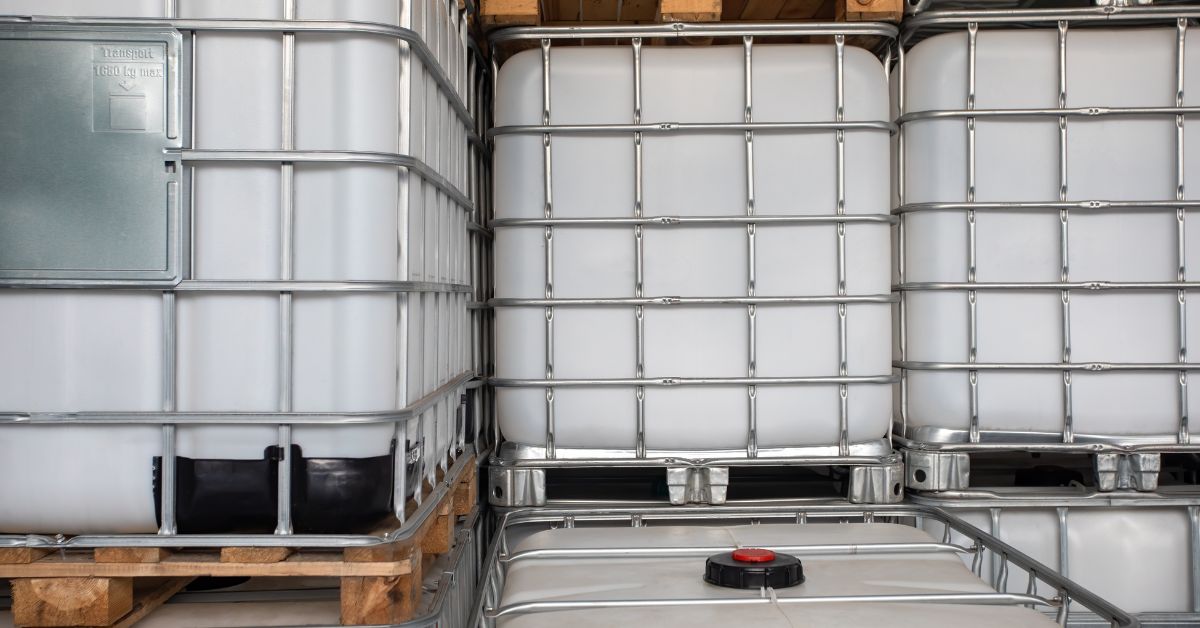In our rapidly industrializing world, the use of plastic chemical tanks has become ubiquitous across a variety of sectors. These tanks provide a durable, cost-effective solution for storing and transporting chemicals. However, the end of their lifecycle presents a complex challenge: safe disposal. Improper handling can lead to severe environmental and health risks, making it imperative for industries to adopt responsible practices.
Here’s how to safely dispose of plastic chemical tanks, ensuring both workplace safety and environmental health.
The Benefits of Plastic Chemical Tanks
Plastic chemical tanks offer numerous advantages over their metal counterparts. They’re inherently resistant to corrosion, relatively lightweight, and have excellent durability. Their nonreactive surface makes them ideal for holding a wide variety of chemicals without degrading over time. This resilience contributes to their longevity and reduces the frequency of replacement, thereby minimizing waste. Additionally, plastic tanks are easy to install and require minimal maintenance, making them a popular choice in various industries.
Industries Reliant on Plastic Chemical Tanks
Several industries rely heavily on plastic chemical tanks for their operations, underlining their broad applicability and importance in the contemporary industrial landscape:
- Agriculture: Used for storing fertilizers and pesticides, these tanks help in the efficient and safe distribution of chemicals across agricultural fields, contributing significantly to increased productivity and crop yield.
- Pharmaceuticals: In this sector, plastic chemical tanks are critical for storing various chemicals and solutions needed in drug production, ensuring that these sensitive materials remain in a contamination-free environment.
- Water treatment: These tanks are essential for holding chemicals used in the purification and treatment of water, playing a key role in maintaining public health and safety.
- Manufacturing: Many manufacturing processes employ plastic tanks for the storage of chemicals needed in production, from cleaning solutions to raw material preparations.
- Mining: For the mining industry, these tanks are indispensable for storing the chemicals used in the extraction and processing of minerals.
- Food and beverage: The food and beverage industry uses these tanks for storing ingredients, including additives and preservatives, under conditions that keep them safe for consumption.
These sectors benefit significantly from the use of plastic tanks but also bear the responsibility for their disposal.
Understanding the Risks of Improper Disposal
The improper disposal of plastic chemical tanks can have dire consequences. Residual chemicals may leach into the ground, contaminating soil and water sources and posing a threat to wildlife and human health. Additionally, the decomposition of plastic releases harmful substances, including greenhouse gases, exacerbating climate change. The disposal of tanks used to hold hazardous chemicals, such as acids and solvents, requires specialized handling to prevent damage to the environment and human life.
Legal and Regulatory Framework
Governments have established several laws and regulations to mitigate these risks. In the United States, the Environmental Protection Agency (EPA) outlines specific guidelines under the Resource Conservation and Recovery Act (RCRA), focusing on the treatment, storage, and disposal of hazardous waste. Similar frameworks exist worldwide, emphasizing the importance of adherence to legal standards for environmental protection. Failure to comply with these regulations can result in hefty fines and legal action.
Best Disposal Practices for Plastic Chemical Tanks
There are many different options when it comes to safe plastic chemical tank disposal. Understanding their benefits and drawbacks will help you make the best decision for your own business:
Recycling
Whenever possible, recycling is the preferred method of disposal for plastic tanks. This process reduces the volume of waste in landfills, conserves resources, and minimizes the environmental impact by lowering the demand for new raw materials. However, recycling may not be a viable option for tanks contaminated with hazardous materials.
Professional Waste Management Services
Engaging services that specialize in hazardous waste can ensure that these tanks are disposed of or recycled in compliance with legal and environmental standards. These professionals have the knowledge and equipment necessary to handle dangerous chemicals safely. They also possess the necessary permits and licenses to transport hazardous materials.
Chemical Decontamination
Prior to disposal, it’s crucial to decontaminate the tanks, removing or neutralizing any residual chemicals. This step prevents the risk of pollution and harm to the environment and public health. Professional waste management services can also provide this service.
Incineration
In cases where recycling is not feasible, especially for tanks contaminated with hazardous materials, high-temperature incineration by certified facilities can be an effective method of disposal. This process must be carried out with strict pollution control measures to prevent the release of toxic emissions.
Reconditioning and Reuse
If the tanks are still in good condition, reconditioning for reuse in a different capacity can be a sustainable option. This approach extends the life of the tanks, reducing the need to produce new plastic products, but thorough decontamination and inspection for structural integrity are required.
Landfill Disposal
If no other disposal options are available, disposing of plastic tanks in a permitted hazardous waste landfill is the last resort. However, this method must comply with strict regulations to prevent environmental contamination.
Toward Sustainable Waste Management
Moving the industry toward sustainable waste management requires a multifaceted approach that not only addresses the end-of-life disposal of plastic chemical tanks but also incorporates the principles of sustainability throughout the lifecycle of these products. To achieve this, industries can adopt the following strategies:
- Implementing extended producer responsibility (EPR): Under EPR programs, manufacturers are encouraged or required to take back used products and manage their disposal or recycling.
- Enhancing product design: By designing plastic chemical tanks for durability, reparability, and recyclability, manufacturers can reduce environmental impact.
- Promoting circular economy principles: Transitioning toward a circular economy involves minimizing waste and making the most of resources.
- Adopting green procurement policies: Organizations can influence the market by prioritizing the purchase of sustainably designed and manageable waste products.
- Increasing stakeholder engagement and collaboration: Sharing best practices, technologies, and strategies can help in overcoming challenges associated with sustainable waste management.
- Investing in research and development: Investment in R&D can lead to the discovery of new materials and technologies that make chemical tanks more sustainable.
- Educating and raising awareness: Educating stakeholders about the importance of sustainable waste management and the environmental impact of improper disposal can foster a culture of responsibility and innovation.
By taking these steps, the industry can move toward more sustainable waste management practices, mitigating the environmental impact of plastic chemical tanks and contributing to a healthier planet.
Taking Action Today To Safeguard the Future
The safe disposal of plastic chemical tanks represents a significant challenge but also an opportunity to demonstrate environmental stewardship. By understanding the risks involved, adhering to legal and regulatory frameworks, and implementing best practices for disposal, industries can mitigate the adverse effects on the environment and public health.
All stakeholders must play their part in fostering a more sustainable future. If you’re looking for a custom tank manufacturer dedicated to these principles, Miller Plastic Products is driving the future of production. The health of our planet depends on our collective action today.





